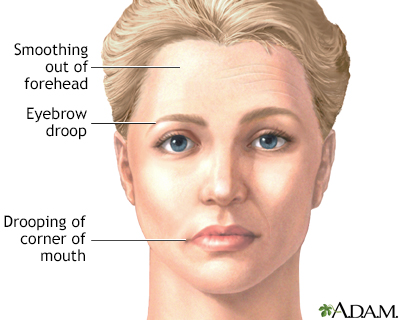Pregnancy SmartSiteTM
Hunt syndrome; Herpes zoster oticus; Geniculate ganglion zoster; Geniculate herpes; Herpetic geniculate ganglionitis DefinitionRamsay Hunt syndrome is a painful rash around the ear, on the face, or on the mouth. It occurs when the varicella-zoster virus infects a specific nerve in the head. CausesThe varicella-zoster virus that causes Ramsay Hunt syndrome is the same virus that causes chickenpox and shingles. In people with this syndrome, the virus is believed to infect the facial nerve near the inner ear. This leads to irritation and swelling of the nerve. The condition mainly affects adults. In rare cases, it is seen in children. SymptomsSymptoms may include:
Exams and TestsYour health care provider will usually diagnose Ramsay Hunt Syndrome by looking for signs of weakness in the face and a blister-like rash. Tests may include:
TreatmentStrong anti-inflammatory medicamentos called steroids (such as prednisone) are usually given. Antiviral medicines, such as acyclovir or valacyclovir will usually be given. Sometimes strong painkillers are also needed if the pain continues even with steroids. While you have weakness of the face, wear an eye patch to prevent injury to the cornea (corneal abrasion) and other damage to the eye if the eye does not close completely. Some people may use a special eye lubricant at night and artificial tears during the day to prevent the eye from drying out. If you have dizziness, your provider can advise other medicines. Outlook (Prognosis)If there is not much damage to the nerve, you should get better completely within a few weeks. If damage is more severe, you may not fully recover, even after several months. Overall, your chances of recovery are better if the treatment is started within 3 days after the symptoms begin. When treatment is started within this time, most people make a full recovery. If treatment is delayed for more than 3 days, there is less of a chance of complete recovery. Children are more likely to have a complete recovery than adults. Possible ComplicationsComplications of Ramsay Hunt syndrome may include:
Occasionally, the virus may spread to other nerves, or even to the brain and spinal cord. This can cause:
If these symptoms occur, a hospital stay may be needed. A spinal tap may help determine whether other areas of the nervous system have been infected. When to Contact a Medical ProfessionalContact your provider if you lose movement in your face, or you have a rash on your face and facial weakness. PreventionThere is no known way to prevent Ramsay Hunt syndrome, but treating it with medicine soon after symptoms develop can improve recovery. ReferencesDinulos JGH. Warts, herpes simplex, and other viral infections. In: Dinulos JGH, ed. Habif's Clinical Dermatology. 7th ed. Philadelphia, PA: Elsevier; 2021:chap 12. Gantz BJ, Shibata SB, Sullivan CB, et al. Management of Bell's palsy and Ramsay Hunt syndrome. In: Brackmann DE, Shelton C, Arriaga MA, eds. Otologic Surgery. 5th ed. Philadelphia, PA: Elsevier; 2023:chap 26. Naples JG, Brant JA, Ruckenstein MJ. Infections of the external ear. In: Flint PW, Francis HW, Haughey BH, et al, eds. Cummings Otolaryngology: Head and Neck Surgery. 7th ed. Philadelphia, PA: Elsevier; 2021:chap 138. Waldman SD. Ramsay Hunt syndrome. In: Waldman SD, ed. Atlas of Uncommon Pain Syndromes. 4th ed. Philadelphia, PA: Elsevier; 2020:chap 14. | ||
| ||
Review Date: 6/13/2024 Reviewed By: Joseph V. Campellone, MD, Department of Neurology, Cooper Medical School at Rowan University, Camden, NJ. Review provided by VeriMed Healthcare Network. Also reviewed by David C. Dugdale, MD, Medical Director, Brenda Conaway, Editorial Director, and the A.D.A.M. Editorial team. View References The information provided herein should not be used during any medical emergency or for the diagnosis or treatment of any medical condition. A licensed medical professional should be consulted for diagnosis and treatment of any and all medical conditions. Links to other sites are provided for information only -- they do not constitute endorsements of those other sites. No warranty of any kind, either expressed or implied, is made as to the accuracy, reliability, timeliness, or correctness of any translations made by a third-party service of the information provided herein into any other language. © 1997- A.D.A.M., a business unit of Ebix, Inc. Any duplication or distribution of the information contained herein is strictly prohibited. | ||


 Facial drooping
Facial drooping
